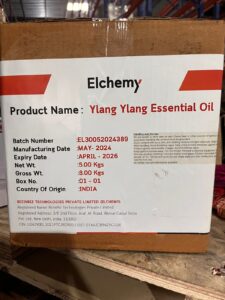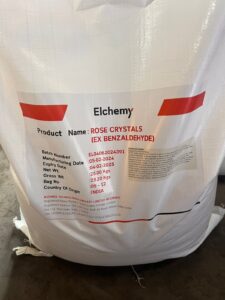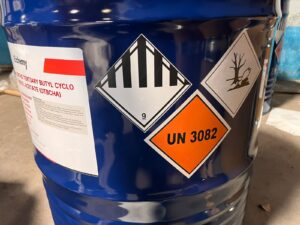At a glance: This blog offers a holistic understanding of the role played by labels in chemical manufacturing, their key elements, commonly used phrases in labels, importance of SDS chemical doc and the best practices in chemical labeling.
Introduction:
In the world of chemical manufacturing, where precision, safety, and compliance are of utmost importance, labeling plays a crucial role. From ensuring the safe handling and storage of chemicals to facilitating compliance with regulations, chemical labels are an indispensable component of the industry. So, if you’ve been wondering what are the requirements for chemical labels and their importance in chemical manufacturing, along with their critical functions and the reasons why they are indispensable, then you should stick around till the end.
The Role of Labels in Chemical Manufacturing

Chemical manufacturing involves the production of a wide array of substances, from industrial chemicals to pharmaceuticals. The complex nature of these processes necessitates meticulous documentation and labelling. Here’s why labels are so vital in this industry:
Safety and Hazard Communication:
Labels provide essential information about the hazards associated with chemicals.
They help in identifying the risks, such as flammability, toxicity, and reactivity.
Proper labeling ensures that workers handle and store chemicals safely, minimizing accidents and exposure.
Regulatory Compliance:
Regulatory bodies like OSHA, EPA, and REACH mandate stringent labeling requirements.
Chemical labels must include specific information to comply with these regulations.
Non-compliance can result in hefty fines and legal repercussions, making accurate labeling crucial.
Inventory Management:
Labels aid in the efficient tracking and management of chemical inventories.
They provide detailed information about the contents, batch numbers, and expiration dates.
This helps in maintaining accurate records and facilitates smooth operations.
What are the requirements of Chemical Labels?

A comprehensive chemical label must include several critical elements to serve its purpose effectively. Here are the essential components:
Product Identifier: The name or number used to identify the chemical.
Signal Words: Indicating the severity of the hazard (e.g., Danger, Warning).Hazard Statements: Describing the nature and degree of the risk.
Precautionary Statements: Advising on measures to minimize or prevent adverse effects.
Supplier Identification: Information about the chemical suppliers, including name, address, and contact details.
Pictograms: Standardized symbols to convey hazard information visually.
Precautionary Words & Their Meanings in Chemical Labels

When handling chemicals, it’s crucial to understand the precautionary sentences and words used on labels to ensure safe handling, storage, and disposal. Here are some common ones:
1. Warning: Indicates a potential hazard, but the risk is relatively low.
2. Caution: Signals a moderate level of risk, requiring attention and care.
3. Danger: Signifies a high level of risk, demanding extreme caution.
4. Poison: Indicates a highly toxic substance, requiring special handling.
5. Flammable: Warns of a fire hazard, necessitating proper storage and handling.
6. Corrosive: Indicates a substance that can cause burns or damage materials.
7. Oxidizer: Signals a substance that can ignite or enhance combustion.
8. Toxic: Indicates a substance harmful if ingested, inhaled, or in contact with skin.
9. Harmful: Signals a substance that can cause health issues, but less severe than toxic.
10. Irritant: Indicates a substance causing skin, eye, or respiratory irritation.
11. Explosive: Warns of a substance that can detonate or explode.
12. Radioactive: Signals a substance emitting ionizing radiation.
The Importance of SDS Chemical Doc
Safety Data Sheets (SDS) are integral to chemical labeling. An SDS chemical document provides detailed information about the properties, hazards, and handling of chemicals. Here’s why SDS chemical documents are crucial:
Comprehensive Information:
- SDS documents offer in-depth details about chemical properties and hazards.
- They include information on physical and chemical characteristics, health hazards, and environmental impact.
Emergency Response:
- In case of a chemical spill or exposure, SDS documents guide emergency responders on the appropriate actions.
- They provide instructions on first aid measures, firefighting procedures, and spill containment.
Worker Training:
- SDS chemical information is used to train employees on safe handling and emergency procedures.
- Ensuring that workers are well-informed about the chemicals they work with is essential for workplace safety.
How Do Chemical Suppliers Ensure Proper Labeling?
Chemical suppliers play a pivotal role in the labeling process. They must ensure that their products are labeled accurately and in compliance with regulations. Here’s how chemical suppliers contribute to proper labeling:
Compliance with Standards: Chemical suppliers adhere to national and international labeling standards. They ensure that all required information is included on the labels.
Quality Control: Suppliers implement stringent quality control measures to ensure label accuracy. This includes verifying the information and ensuring it is up-to-date.
Providing SDS Documents: Chemical suppliers must provide comprehensive SDS chemical documents with their products. This ensures that users have access to detailed safety information.
Best Practices for Effective Chemical Labeling
To overcome these challenges and ensure effective labeling, chemical manufacturers and suppliers should adhere to the following best practices:
- Regular Training: Train employees on the importance of labeling and how to interpret labels and SDS chemical documents.
- Periodic Reviews: Regularly review and update labels and SDS documents to reflect any changes in formulations or regulations.
- Use of Technology: Leverage technology to manage labeling processes efficiently. Use software solutions to automate label generation and ensure consistency.
- Clear Communication: Ensure that labels are clear, legible, and provide all necessary information. Use pictograms and standardized symbols for easy understanding.
Sticky Situations: Chemical Labeling ChallengesDespite its importance, chemical labeling comes with several challenges:
- Keeping Information Up-to-Date:
Chemical formulations and regulations change frequently. Ensuring that labels and SDS documents are updated regularly is a significant challenge. - Global Harmonization: Different countries have varying labeling requirements.
Achieving compliance with global standards like the Globally Harmonized System (GHS) can be complex. - Accuracy and Clarity: Labels must be clear and legible to be effective. Ensuring accuracy and avoiding mislabeling is critical to prevent accidents and ensure compliance.
Penalties for Incorrect Chemical Labeling
In the United States, incorrect chemical labeling can result in severe penalties, including fines, imprisonment, and legal liability. Here’s an overview of penalties for wrong chemical labeling in the US:
- OSHA (Occupational Safety and Health Administration) fines for non-compliance with labeling regulations
- EPA (Environmental Protection Agency) fines for non-compliance with hazardous waste labeling regulations
- DOT (Department of Transportation) fines for improper labeling of hazardous materials during transportation
- Criminal penalties, including imprisonment and fines, are levied for willful or repeated violations
- In addition to these penalties, companies may also face legal liability for damages, injuries, or environmental harm caused by incorrect chemical labeling. Furthermore, reputational damage and loss of business can result from non-compliance.
Trust Elchemy to Solve Your Chemical Labeling Woes
With access to a vast database of chemicals and regulatory information, and a rigorous quality check process in place, Elchemy eliminates the scope for error in chemical labeling. Elchemy simplifies chemical labeling for suppliers, ensuring compliance and safety. Our capability to support multiple languages and formats makes it easy for our clients to customize their labeling needs. Moreover, our platform reduces hassles for our clients by allowing them to mention all labeling requirements during the initial placement of the order. To simplify your chemical manufacturing, labeling & overall sourcing process, reach out to us today at elchemy.com.






















